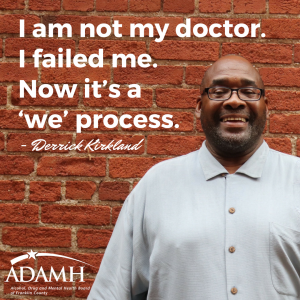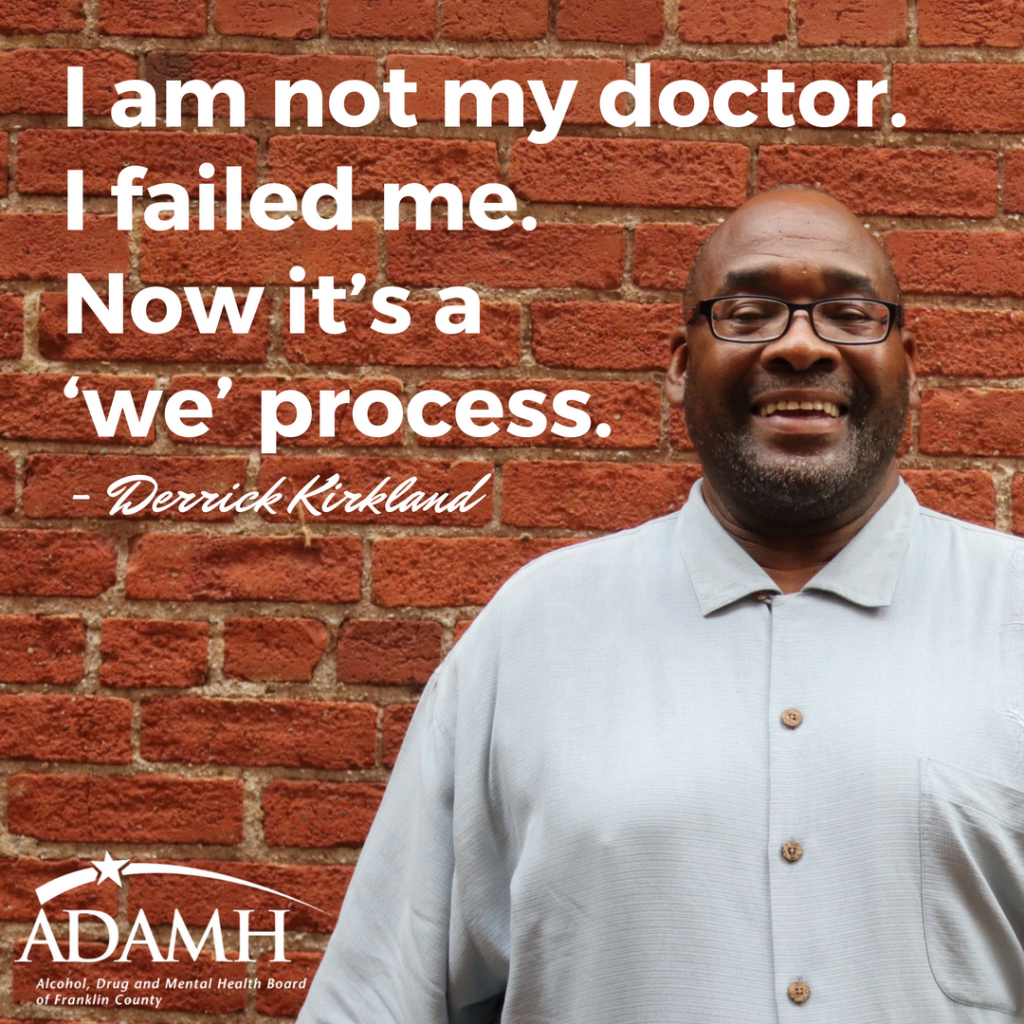
Derrick Kirkland flashed a big smile as he excitedly showed a picture of his 37-year old son and explained that he would become a grandpa in January, but this proud father hasn’t always been so close to his son. When his son was just three months old, Derrick had to make the difficult decision to send his fiancé and baby boy away so that he could continue to live in the adults-only community he called home. After 22 years with no contact, Derrick was finally able to find his son on Facebook and reconnect.
“Where have you been?” his son questioned; but after Derrick explained what he had been going through, his son understood that today, Derrick has a purpose.
Derrick’s exposure to addiction began when he was just a baby. His mother left him and his siblings with their father when Derrick was only a year old to escape her husband’s alcoholism and abuse. After four years, she came back for them and they moved to Ohio in 1963.
The transition was shocking to Derrick, an African American child who was used to the realities of segregation and was exposed to the integrated city of Columbus for the first time. Even though Columbus was more progressive when it came to racial integration, there was still a long way to go. Ohio’s race riots of 1969 signaled the start of Derrick’s battle with anxiety.
Derrick always strived to fit in and be liked, even to the point of refusing to wear his glasses to school for fear of being teased. After joining in on multiple sports teams and theater, Derrick was introduced to alcohol at the age of 13 and marijuana at 14. By age 16, he was acting as bartender for friends’ parties. He remembers one New Year’s Eve party in particular when he blacked out for the first time.
Even though he had been exposed to issues of addiction, he did not understand at that time what it meant to live with alcoholism or to experience mental illness. These terms were foreign to him; instead, he saw the issues as being a part of regular everyday life.
After high school, Derrick attempted to go to college and play football, but allowed the opinions of others to influence his decisions. Going back and forth between colleges and jobs, he met the mother of his child and, for a time, was held accountable.
Feeling forced into the decision of sending his fiancé and son away sent him into a three-year spiral of alcoholism and cheating. This was when he found cocaine. Right at the beginning of the crack cocaine epidemic, Derrick began his addiction to the drug while attending parties with the high level socialites and musicians of the area. He was yet again making decisions to fit in with the crowd and allowing others to influence his life choices.
In 1986, Derrick was checked into his first treatment center where he was told that he was an addict and alcoholic. At this point of his life, Derrick was surrounded by fancy cars and nice things. When he pictured an addict, other stereotypical images came to mind. Derrick was in denial about his own addiction. He describes this time of his life as the “Merry-go-Round of Denial” where colors may change and he experienced ups and downs, but he was mostly just along for the ride.
By 1990, after becoming homeless and even getting kicked out by his own mother because of his addiction, Derrick had managed to pull his life back together. He got to the point where he thought he could go to a party and have just one drink, but that one drink pulled him right back into the cycle of addiction.
Derrick went to Maryhaven in 1998 where he was connected with House of Hope. There he was able to confront his behaviors and begin to address how drugs and alcohol affected him. This process helped him take the blinders off and realize that doing things “my way” didn’t work. He was in and out of hospitals and treatment centers until he hit a turning point on July 14, 2011. His best friend had died of an overdose and he realized that he was only existing, not living. He felt like his life had no purpose and that he was not useful. This low point is what it took for Derrick to surrender and admit to himself that he was living with alcoholism, addiction, anxiety and depression. He made the decision then to stop being a “user” – of drugs and alcohol, and also of people.
After a 10-day stay at Netcare and connecting with a counselor at Columbus Area, he began treating his problems with prescribed medications, starting at the highest dosage available. Derrick also began attending anonymous meetings to manage his addictions to food, alcohol, and other drugs.
He has made progress over the years and is now taking his medications at the lowest dosage available. Derrick has even become a certified Peer Recovery Supporter and Facilitator, facilitating recovery groups and training others to become Peer Recovery Supporters themselves. He has worked at the PEER Center (Peers Enriching Each other’s’ Recovery) as a Support Coordinator for three years now and has presented at over 100 speaking engagements at various treatment centers and correctional facilities.
“God placed me where I needed to be,” Derrick said of finding the consumer operated services at the PEER Center.
For Derrick, cooking and learning about other cultures has become part of his recovery process. He is the head cook for a breakfast ministry put on by the Salvation Army East Main Corps and enjoys watching the cooking and travel channels to discover more about other cultures through the food they eat. He grieved along with many when Anthony Bourdain lost his battle with depression.
Derrick now understands, after 7 years in recovery and many prior failed attempts, that this is a continuous process that has to be taken on one day at a time and that he can’t do it alone.

